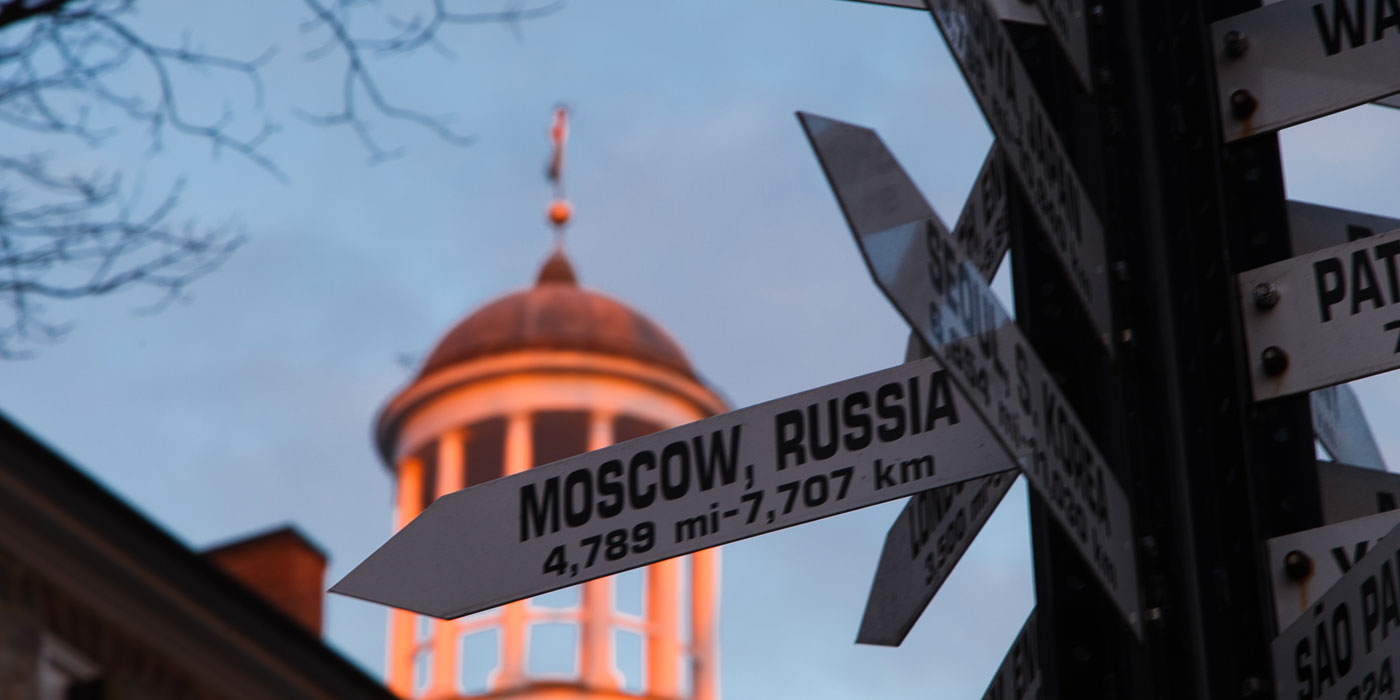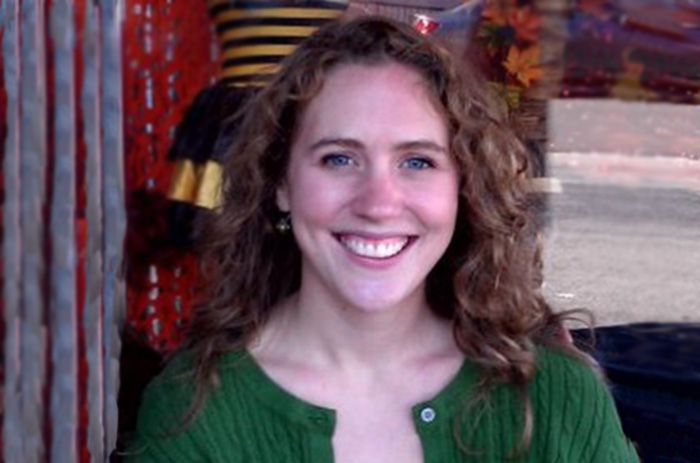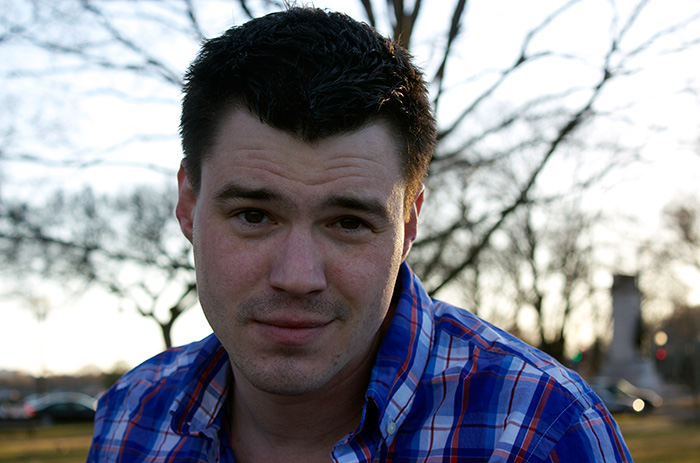Fulbrighters: Where are they now?

Dickinson's global directional sign.
by MaryAlice Bitts-Jackson
Last year, Dickinson was named one of the State Department's top Fulbright-producing colleges for the fifth time in 10 years. What do our young alumni do after completing the Fulbright program? We checked in with recent grads Kathryn McNamara '11, Alexander Brock '08 and Phoebe Oldach '13 to find out.
Phoebe Oldach '13
University of Delhi, India
Fulbright highlight:
- Working in the lab at the University of Delhi. "There were significant differences in the university system—from lab practices to hours worked, to relationships with mentors—but I was lucky to work closely with a group of around 20 Ph.D. candidate labmates from Delhi and the surrounding areas," she says. "They taught me a lot and made the experience incredibly fun."
What she gained:
- A "dramatically strengthened appreciation" for languages. ("Knowing even a little bit of humorously-bad Hindi opened doors for connections and friendliness and insights," she says.)
- A greater understanding of the challenges researchers encounter and the tools to overcome them.
- A clearer view of the paths ahead. “Having this experience is definitely valuable for me as I think about graduate schools," she says. "It also helps me to think not only about what fields and research problems most draw me but also about the sort of mentorship and research environment in which I work the best.”
Post-Fulbright news:
- Pursuing an M.Phil. in computational biology at the University of Cambridge. Like many recent Fulbrighters, Oldach recently returned to Dickinson at the close of her Fulbright year to discuss her experiences with students interested in the program.
Advice to students interested in the Fulbright program:
- Be creative. "Fulbright offers a unique opportunity for students to be wildly creative in thinking about what really interests and drives you, both in terms of academic topics and geographic location," she says. "Make the most of it by casting a wide net when initially brainstorming projects, and come up with something that really excites you."
- Identify and tap resources. "The vast majority of projects require assistance, whether in the form of physical resources such as a lab, specialized equipment, access to archives or museum collections, or human resources, such as connections for interview-based work or in-country know-how," she says.
- Be prepared so you can be fully engaged in the Fulbright experience. "If I could change anything, I would have started learning Hindi, taken the GRE and applied to graduate schools before going abroad," she says.
Kathryn McNamara ’11
Bandung, Indonesia

Kathryn McNamara '11 is a global-health specialist at HTH Worldwide; she's also pursuing a master's degree in public health.
Kathryn McNamara '11 is a global-health specialist at HTH Worldwide; she's also pursuing a master's degree in public health.
Fulbright highlights:
- Developed meaningful relationships and had in-depth conversations that would not have been possible during a shorter visit, including dialogues about gender roles, American foreign policy and the importance of proximity in understanding world cultures and religions.
- Taught an aerobics class for women teachers at an Islamic boarding school (while wearing long skirts and a headscarf).
What she gained:
- A better understanding of international careers.
- New interests, including public health. ("Seeing the ravages of infectious diseases such as typhoid fever gave me [that interest in public health], which I'm focusing on for my graduate degree," she says.)
- Confidence and greater adaptability: After adjusting to life in Indonesia, it was not as difficult to move to a new city and grow accustomed to her first full-time job.
Post-Fulbright news:
- Pursuing a master’s degree in public health at Drexel University.
- Celebrating two-year work anniversary as a global-health specialist at HTH Worldwide in Philadelphia ("a job I got through the Career Center," she notes).
- Volunteering for an organization that provides services for homeless veterans in Philadelphia.
- Learning to windsurf in spare time.
Short-term goals:
- After achieving a master’s degree in public health, pursue a fellowship focusing on environmental health and bioterrorism.
- Visit the Western U.S. (Next trip: skiing in Wyoming or Colorado.)
Advice to students interested in the Fulbright program:
- "Pick somewhere from your bucket list, and make a compelling case for yourself."
- "Definitely make an effort to learn the language before you go."
Alexander Brock '08
The American University in Cairo, Egypt

After working on several high-profile projects and serving as translator for the Arabic-language National Geographic, Alexander Brock '08 is pursing a J.D.
Fulbright highlights:
- Worked with well-known actor Ahmed Helmy (known as "the Middle East's Jim Carrey") on the movie Assal Eswed, providing translation services for the English-language version of the film.
- Volunteered as an English tutor at Cairo's famous “Garbage City."
- Made connections in Egypt, Iran, Syria and Tanzania that "significantly informed the person I am today," he says, leading directly to his job in the Council of Foreign Relations in Washington, D.C., and influencing his decision to apply to law school.
Post-Fulbright news:
- While working as a researcher in the Council of Foreign Relations, assisted author Steven A. Cook as he prepared his book The Struggle for Egypt for publication.
- Worked with former Secretary of State Madeleine Albright and former National Security Advisor Stephen J. Hadley on a yearlong project related to U.S. foreign policy toward Turkey; this included traveling to Turkey to meet with the Turkish president Abdullah Gül at the Çankaya Palace in Ankara.
- For two years, worked as translation editor for National Geographic magazine’s Arabic edition.
- Recently relocated to pursue a J.D. at the University of California, Berkeley School of Law.
Short-term plans:
- Take every opportunity to return to the Middle East. ("It's in my blood now," he says.)
- After law school, practice international law in the Middle East—either as a human-rights lawyer or through employment with the United Nations or U.S. government.
Advice to students interested in the Fulbright program:
- "Absolutely apply, if you have a research project that you are both qualified for and passionate about," he says.
- Invest time to craft and fine-tune your personal statement. "Remember, Fulbright is not only funding your research; they’re also funding you," he says. "They want to see not only why your research would be an important contribution to scholarship and multicultural mutual understanding, but also why you are the person who should do that project."
Learn more
- Fulbrights at Dickinson
- Dickinson's Fulbright Success
- "Dickinson Named Top Fulbright Producing College"
- Fellowships at Dickinson
- Latest News
Published October 2, 2014